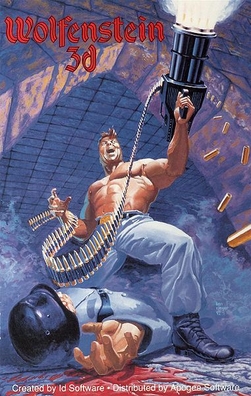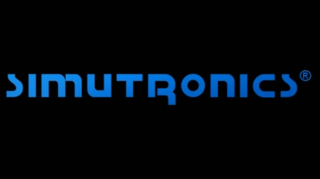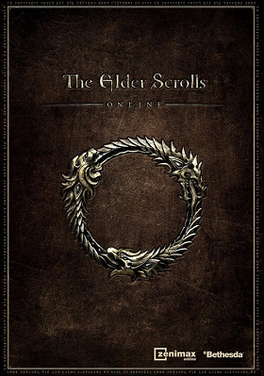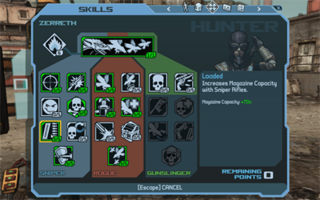Related Research Articles

Wolfenstein 3D is a first-person shooter video game developed by id Software and published by Apogee Software and FormGen. Originally released on May 5, 1992, for DOS, it was inspired by the 1981 Muse Software video game Castle Wolfenstein, and is the third installment in the Wolfenstein series. In Wolfenstein 3D, the player assumes the role of Allied spy William "B.J." Blazkowicz during World War II as he escapes from the Nazi German prison Castle Wolfenstein and carries out a series of crucial missions against the Nazis. The player traverses each of the game's levels to find an elevator to the next level or kill a final boss, fighting Nazi soldiers, dogs, and other enemies with a knife and a variety of guns.

BioWare is a Canadian video game developer based in Edmonton, Alberta. It was founded in 1995 by newly graduated medical doctors Ray Muzyka, Greg Zeschuk and Augustine Yip, alongside Trent Oster, Brent Oster, and Marcel Zeschuk. Since 2007, the company has been owned by American publisher Electronic Arts.
A game engine is a software framework primarily designed for the development of video games and generally includes relevant libraries and support programs such as a level editor. The "engine" terminology is akin to the term "software engine" used more widely in the software industry.

Simutronics is an American online games company whose products include GemStone IV and DragonRealms. It was founded in 1987 by David Whatley, with husband and wife Tom & Susan Zelinski. The company is located in St. Louis, Missouri. It became part of the Stillfront Group in 2016.

The Game Developers Choice Awards are awards annually presented at the Game Developers Conference for outstanding game developers and games. Introduced in 2001, the Game Developers Choice Awards were preceded by the Spotlight Awards, which were presented from 1997 to 1999. Since then, the ceremony for the Independent Games Festival is held just prior to the Choice Awards ceremony.
RenderWare is a video game engine developed by British game developer Criterion Software.
Perpetual Entertainment, founded in March 2002, was an American developer, publisher and operator of networked multiplayer games and MMORPGs. Their headquarters was located in San Francisco, California, United States. From October 2007 to February 2008 the company was known as P2 Entertainment. The company was best known for its development of two MMOs: Star Trek Online and Gods & Heroes: Rome Rising.

Vivox Inc. is an American communications company that manages communication services in the form of integrated voice chat, Instant Messaging (IM) to online games, virtual worlds and other online communities. It is headquartered in Framingham, Massachusetts.
ZeniMax Online Studios LLC is an American video game developer and a subsidiary of ZeniMax Media, specializing in massively multiplayer online games. The company developed The Elder Scrolls Online and its downloadable content. ZeniMax Online Studios had around 250 employees in 2012. In addition to the main Hunt Valley, Maryland based office, ZeniMax Online also maintains a satellite studio in Budapest, Hungary as well as a customer support center in Galway, Ireland and an additional office in Austin, Texas.
Riot Sydney is an Australian software company, formed in 2002 by John De Margheriti. It was the developer of BigWorld, a middleware development tool suite for creating massively multiplayer online games (MMO) and virtual worlds. It was the first company that developed a middleware platform for the MMO market. In 2007, BigWorld was recognised by the UK's Develop magazine as an industry leader.
Trinigy was a German software development company.
Q is a 3D engine / tech development platform / interoperability standard developed by the London-based developer Qube Software.
David Whatley is the president and CEO of Simutronics Corporation, a multiplayer game company in St. Charles, Missouri. He was the co-founder of the company in 1987, and has been a key developer on all of the company's products, including the GemStone series, DragonRealms, Modus Operandi, Alliance of Heroes, and CyberStrike, which won the Online Game of the Year award from Computer Gaming World magazine in 1993.

Laralyn McWilliams was an American game designer and video game producer.
Western role-playing video games are role-playing video games developed in the Western world, including The Americas and Europe. They originated on mainframe university computer systems in the 1970s, were later popularized by titles such as Ultima and Wizardry in the early- to mid-1980s, and continue to be produced for modern home computer and video game console systems. The genre's "Golden Age" occurred in the mid- to late-1980s, and its popularity suffered a downturn in the mid-1990s as developers struggled to keep up with changing fashion, hardware evolution and increasing development costs. A later series of isometric role-playing games, published by Interplay Productions and Blizzard Entertainment, was developed over a longer time period and set new standards of production quality.
Fork Particle is a computer graphics visual effects modeling and software development kit (SDK) developed and sold by Fork Particle, Inc. Fork Particle uses its real time particle system technology to simulate visual effects or particle effects such as CGI explosions, fire, rain, smoke, dust, etc. Fork Particle is used in video games and visual simulation software such as a flight simulator. It has been licensed to game developers for Windows, macOS, Linux, PlayStation 3, PlayStation 4, Xbox 360 and Xbox One.

The Elder Scrolls Online, abbreviated ESO, is a massively multiplayer online role-playing game (MMORPG) developed by ZeniMax Online Studios and published by Bethesda Softworks. The game is a part of the Elder Scrolls series. It was released for Windows and macOS in April 2014, for PlayStation 4 and Xbox One in June 2015, and for PlayStation 5 and Xbox Series X/S in June 2021.
Make Something Unreal, also known as $1,000,000 Make Something Unreal Contest and Make Something Unreal Live, was a series of video game development competitions organised by Epic Games which began in 2004, with subsequent competitions in 2008, 2012, and 2013. The contests aimed to reward developers who created mods using the Unreal game engine. Make Something Unreal has not returned since the event in 2013. Epic Games has since launched Epic MegaGrants, a grant based scheme, in 2019.

The high-profile and protracted five-year development of the video game Fez led to its status as an "underdog darling of the indie game scene". The 2012 puzzle-platform game built around rotating between four 2D views of a 3D space was developed by indie developer Polytron Corporation and published by Polytron, Trapdoor, and Microsoft Studios. Over the course of the game's development, Fez designer and Polytron founder Phil Fish received celebrity status for his outspoken public persona and prominence in the 2012 documentary Indie Game: The Movie, which followed the game's final stages of development and Polytron's related legal issues. The game was released to critical acclaim as an Xbox Live Arcade timed exclusive, and was later ported to other platforms. It had sold one million copies by the end of 2013.

Scaleform GFx is a discontinued game development middleware package, a vector graphics rendering engine used to display Adobe Flash-based user interfaces and HUDs for video games. In March 2011, Autodesk acquired Scaleform Corporation and Scaleform GFx became part of the Autodesk Gameware line of middleware. On July 12, 2018, Autodesk discontinued Scaleform GFx, and it is no longer available for purchase.
References
- ↑ Wood, Jon (22 October 2008). "Star Wars: The Old Republic: Updates from Around the Web" . Retrieved 23 October 2008.
- ↑ "Idea Fabrik PLC press release". Idea Fabrik PLC. Retrieved 11 August 2011.
- ↑ Massey, Dana (3 April 2007). "Preview: Hero's Journey & HeroEngine". WarCry Network . Retrieved 2 July 2008.
- ↑ , official forum, "In the current release, simulation and rendering run on a single shared core."
- ↑ HE-Cooper Administrator, official forum, "Faxion's Development cycle was around 18 months. Which, luckily for us, is exactly what the HeroEngine is supposed to do."
- ↑ "The official HeroEngine webpage's feature page". Archived from the original on 9 March 2008. Retrieved 2 July 2008.
- ↑ "The official HeroEngine webpage's management tools page". Archived from the original on 7 March 2008. Retrieved 3 July 2008.
- ↑ Jordan, Jon (May 2008). "Engines of Creation". Game Developer. p. 12.
- ↑ "Licensing Options | HeroEngine". www.heroengine.com. Archived from the original on 17 January 2012.
- ↑ "Front Line Awards". Game Developer magazine . 2006.
HeroEngine finalist for 'Best Engine'
- ↑ "Login". community.heroengine.com.
- ↑ Boyer, Brandon (9 March 2007). "Simutronics' HeroEngine Gets Three Licensees". Gamasutra . UBM . Retrieved 2 July 2008.
- ↑ Biessener, Adam (25 May 2012). "Why The Elder Scrolls Online Isn't Using HeroEngine". Game Informer . UBM . Retrieved 30 July 2019.
- ↑ "It was announced on the HeroEngine Official Twitter page with the post dated Mar 19, 2024".
{{cite web}}: CS1 maint: url-status (link)
- "Online gaming's Netscape moment?". The Economist . 7 June 2007.
- "Leading Technologies Now Available to MMO Developers". Forbes . 18 February 2008.
- "Simutronics Selects DiamondWare for HeroEngine Virtual Worlds Game Platform". Virtual Worlds News. 8 March 2007. Archived from the original on 18 November 2008. Retrieved 2 July 2008.
- Cole, Emmet (30 November 2007). "Online Games Use Fraud Software to Combat Cheats". Wired News . Retrieved 2 July 2008.
- "Virgin Appoints CEO For 3D Digital Distribution". Gamasutra. 30 March 2007. Retrieved 2 July 2008.
- Aihoshi, Richard (31 August 2006). "HeroEngine Interview". Vault Network. Archived from the original on 21 January 2008. Retrieved 2 July 2008.
- "HeroEngine Licensee ZeniMax announces Elder Scrolls Online". 14 May 2012. Retrieved 26 January 2019.